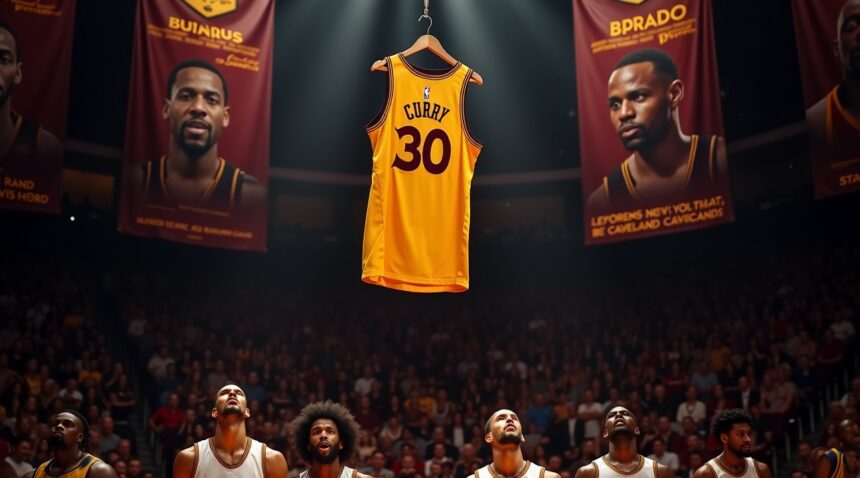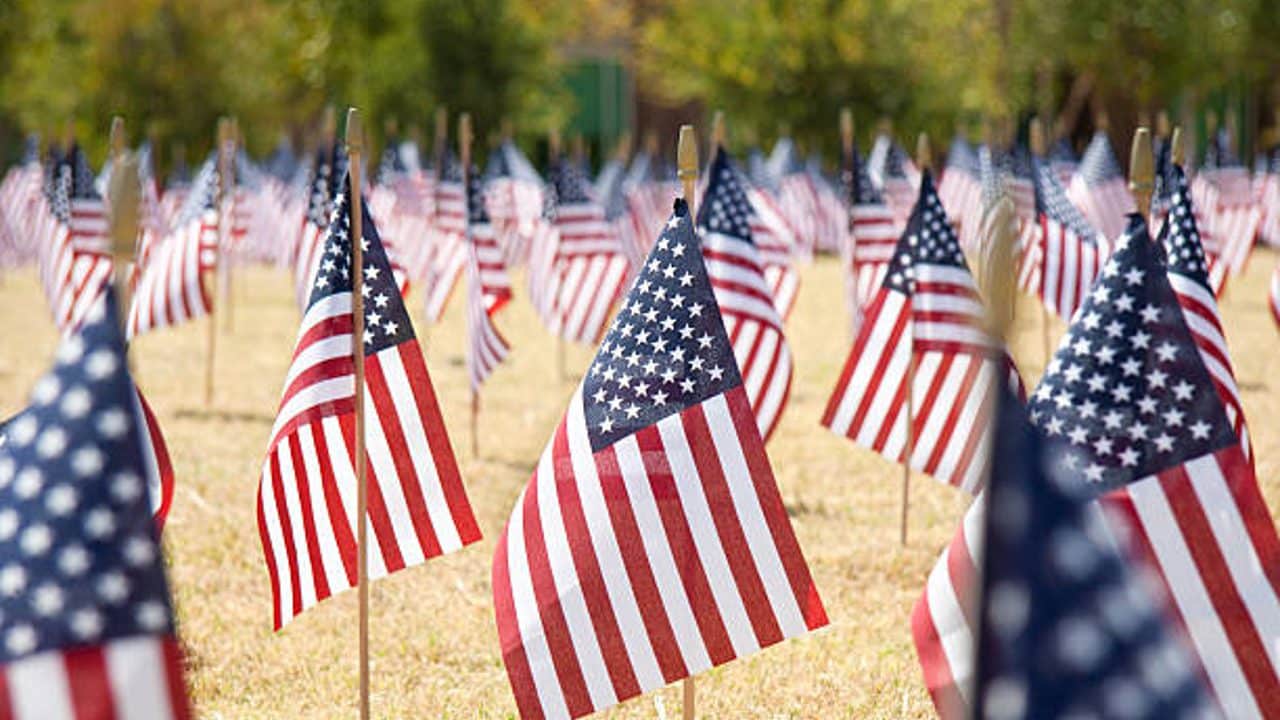The Cleveland Cavaliers have made basketball history by announcing plans to retire Stephen Curry’s jersey number, marking the first time an NBA franchise will honor a player who never wore their uniform.
Key Takeaways
- The Cavaliers will become the first NBA team to retire a rival player’s jersey number, establishing a new precedent in professional sports recognition.
- Cleveland’s decision honors Curry’s role in their 2016 championship story, where they overcame his Warriors team in a historic 3-1 Finals series comeback.
- This move represents a philosophical shift from traditional jersey retirements that only honored franchise players to recognizing basketball excellence regardless of team affiliation.
- The announcement has sparked debate among fans and media about evolving sports traditions, with mixed reactions from traditionalists and progressive supporters.
- Other NBA franchises may follow Cleveland’s lead in recognizing opponents who helped define their most memorable moments and championship narratives.
A Shift in Sports Culture
Redefining What It Means to Honor Excellence
This unprecedented move by the Cavaliers reflects a growing trend in professional sports that values narrative and impact over exclusivity. While jersey retirements have typically been reserved for players who donned a team’s kit, Cleveland’s decision to honor Curry acknowledges how pivotal even an opponent can be in shaping a franchise’s most iconic moments. Curry, the sharpshooting leader of the Warriors, played an integral role in Cleveland’s celebrated comeback in the 2016 NBA Finals.
Fans Divided on the Decision
The news has stirred considerable discussion across social media and sports networks. While some see it as a bold and progressive gesture, others argue it undermines the legacy of homegrown legends. Debates continue on forums like r/nba and talk shows, showcasing how the evolution of sports traditions often invites passionate discourse.
Will Other Teams Follow Suit?
This decision may pave the way for similar actions by other NBA franchises. Recognizing rival players who played pivotal roles in defining a team’s most cherished memories could become an emerging trend. Only time will tell whether this marks the beginning of a broader rethinking of how sports honor greatness, regardless of uniform.
Cavaliers Make Unprecedented Move to Honor Warriors Star
The Cleveland Cavaliers have broken from decades of tradition by announcing plans to retire Stephen Curry’s jersey number, marking the first time in franchise history they’ll honor a player who never wore their uniform. This decision stands as a shocking departure from the organization’s established pattern of recognizing only their own legends.
Breaking Franchise Tradition
Cleveland’s banner collection currently features seven retired numbers, all belonging to players who made significant contributions while wearing Cavaliers colors. The honored group includes:
- Bingo Smith (No. 7)
- Zydrunas Ilgauskas (No. 11)
- Larry Nance Sr. (No. 22)
- Mark Price (No. 25)
- Austin Carr (No. 34)
- Nate Thurmond (No. 42)
- Brad Daugherty (No. 43)
LeBron James’ No. 23 awaits its inevitable retirement ceremony, but even that anticipated addition follows conventional protocol.
The Cavaliers’ commitment to honoring Curry represents a complete philosophical shift. Previous jersey retirements celebrated players who helped build the franchise’s identity through years of service. Curry’s inclusion acknowledges something entirely different – the respect earned through memorable battles against Cleveland during multiple NBA Finals encounters.
Historic Precedent in Professional Basketball
This announcement creates a first in NBA history, as no franchise has previously retired the number of a rival player based solely on competitive excellence shown against them. The move draws interesting parallels to Bill Russell’s league-wide retirement, though that honor recognized his broader impact on basketball rather than specific rivalries.
The decision reflects extraordinary acknowledgment from an organization that faced Curry’s Warriors in multiple championship series. Those Finals battles, particularly the dramatic 2016 series where Cleveland overcame a 3-1 deficit, created lasting memories for both franchises. Curry’s performance throughout those encounters apparently left such an impression that Cleveland’s leadership felt compelled to offer this unique recognition.
Basketball analysts suggest this precedent could influence other franchises to consider similar honors for exceptional opponents. The Cavaliers’ unprecedented move signals a new era where competitive greatness transcends team loyalties, potentially reshaping how organizations view jersey retirement traditions. Their decision establishes Cleveland as pioneers in recognizing basketball excellence regardless of uniform colors, setting a standard that other NBA teams may eventually follow.
The Warriors Superstar Who Defined a Rivalry
Stephen Curry stands as one of basketball’s most transformative figures, a player whose revolutionary approach fundamentally changed how the game is played. His career statistics tell the story of sustained excellence: 24.7 points, 6.4 assists, and 4.7 rebounds per game across 1,026 regular-season appearances. These numbers barely scratch the surface of his impact on the sport.
Record-Breaking Achievements and Accolades
Curry’s trophy case speaks volumes about his dominance. He’s captured four NBA championships and earned two league MVP awards, including the NBA’s only unanimous MVP selection in 2015–16. That same season, he anchored the Warriors’ historic 73-9 regular season record, a mark that shattered the previous standard set by the 1995–96 Chicago Bulls.
The three-point revolution largely began with Curry’s arrival. He holds the all-time NBA record for three-pointers made, approaching nearly 4,000 made shots from beyond the arc as of 2025. This unprecedented marksmanship redefined offensive strategies across the league, forcing teams to adapt their defensive schemes and inspiring countless young players to extend their range.
Playoff Dominance and Finals Legacy
Curry’s postseason resume reinforces his elite status. Across 147 playoff appearances, he’s averaged 27 points per game while accumulating 3,966 points, 912 assists, and 786 rebounds. These performances consistently elevated the Warriors during their championship runs and cemented his reputation as a clutch performer.
The Cavaliers-Warriors rivalry defined an era of NBA basketball, with Curry serving as the primary catalyst for four consecutive Finals matchups from 2015 to 2018. This epic clash saw the Warriors claim three championships while Cleveland captured one memorable title in 2016. Each series showcased different facets of Curry’s game, from his explosive scoring outbursts to his ability to create opportunities for teammates under intense pressure.
His influence extends beyond individual achievements. Curry’s style sparked a league-wide shift that prioritized pace, space, and three-point shooting. Teams began reconstructing their rosters around players who could shoot from distance, fundamentally altering NBA strategy. This transformation makes the NBA’s recent decision to honor legendary players with retired numbers particularly meaningful, as it recognizes how certain athletes transcend traditional boundaries and impact the entire sport.
Curry’s legacy continues evolving, but his place among basketball’s greatest players remains secure. His combination of individual brilliance and team success created a template for modern NBA excellence that countless players still attempt to replicate.
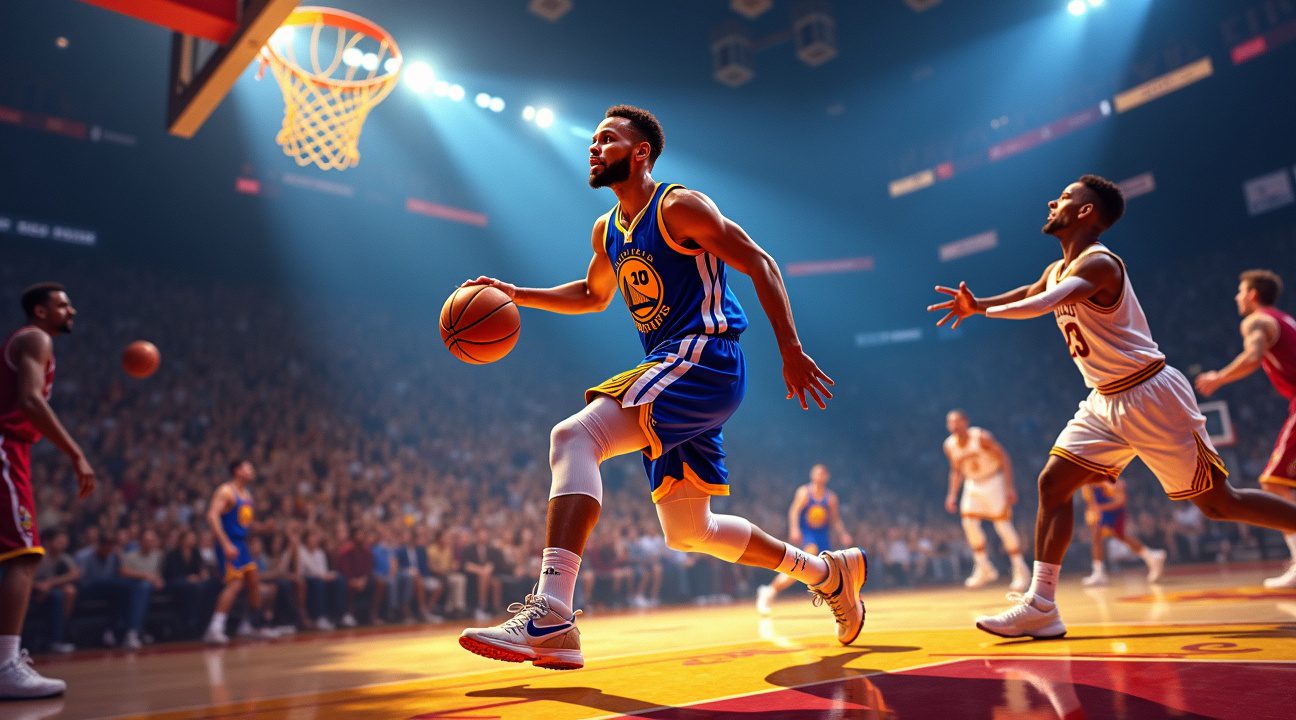
A Historic Rivalry That Shaped Cleveland’s Championship Legacy
Stephen Curry’s presence as the primary antagonist in Cleveland’s championship story has created one of basketball’s most compelling narratives. I observe how this rivalry transcended typical sports competition, becoming deeply woven into the fabric of Cavaliers history and the city’s identity.
The Golden State Warriors, led by Curry, appeared in four consecutive NBA Finals against Cleveland from 2015 to 2018. This unprecedented stretch of matchups between the same two teams created a basketball drama that captivated audiences worldwide. Curry’s exceptional shooting ability and the Warriors’ revolutionary style of play pushed LeBron James and the Cavaliers to their absolute limits, forging a competitive fire that defined an entire era.
The 2016 Championship: Cleveland’s Defining Moment
The 2016 championship stands as the pinnacle of this basketball rivalry and Cleveland’s greatest sports achievement. I recognize how Curry’s Warriors held a commanding 3-1 series lead, appearing destined to repeat as champions. However, Cleveland’s historic comeback transformed Curry from the expected victor into the defeated opponent of one of sports’ greatest underdog stories.
This championship carried extraordinary weight for Cleveland, a city that had endured decades without major sports titles. The fact that Curry and the Warriors were on the losing end of this breakthrough moment has forever linked his legacy to Cleveland’s triumph. NBA Finals history shows few rivalries where the opposing star becomes so intrinsically connected to a franchise’s greatest achievement.
The basketball rivalry between these two teams produced several defining elements that continue to resonate:
- Curry’s record-breaking three-point shooting performances that pushed Cleveland’s defense to innovate new strategies
- The contrasting styles of play that showcased different philosophies about modern basketball
- Individual matchups that featured some of the highest-level basketball ever played on the sport’s biggest stage
- Emotional intensity that created lasting memories for players and fans from both franchises
LeBron James’s leadership during this period was amplified by having Curry as his primary rival. Their battles represented more than individual competition; they embodied different approaches to basketball excellence. Curry’s revolutionary impact on the game forced Cleveland to adapt and evolve, ultimately making their championship victory even more impressive.
The significance of this relationship extends beyond wins and losses. Curry’s Warriors provided the perfect foil for Cleveland’s championship aspirations, creating dramatic tension that elevated every possession. His team’s dominance made Cleveland’s eventual success feel earned rather than inevitable.
This rivalry helped establish both franchises as premier destinations in professional basketball. The Warriors’ success during this period was partly defined by their battles with Cleveland, while the Cavaliers’ identity was forged through competing against Curry’s exceptional teams. The NBA’s decision to retire certain numbers league-wide demonstrates how individual players can transcend team boundaries, much like how Curry’s impact on Cleveland extends beyond typical opponent relationships.
Curry’s role in Cleveland’s story represents something unique in professional sports. He wasn’t merely an opponent; he became an essential character in the Cavaliers’ most important chapter. His presence elevated the stakes, making Cleveland’s championship feel like a victory over one of basketball’s greatest forces rather than a simple tournament win.
The enduring nature of this rivalry continues to influence how both franchises and their fans view their respective histories. Curry’s Warriors provided the ultimate test for Cleveland’s championship team, and their four-year battle created a shared legacy that connects these franchises in ways that extend far beyond typical conference competition.
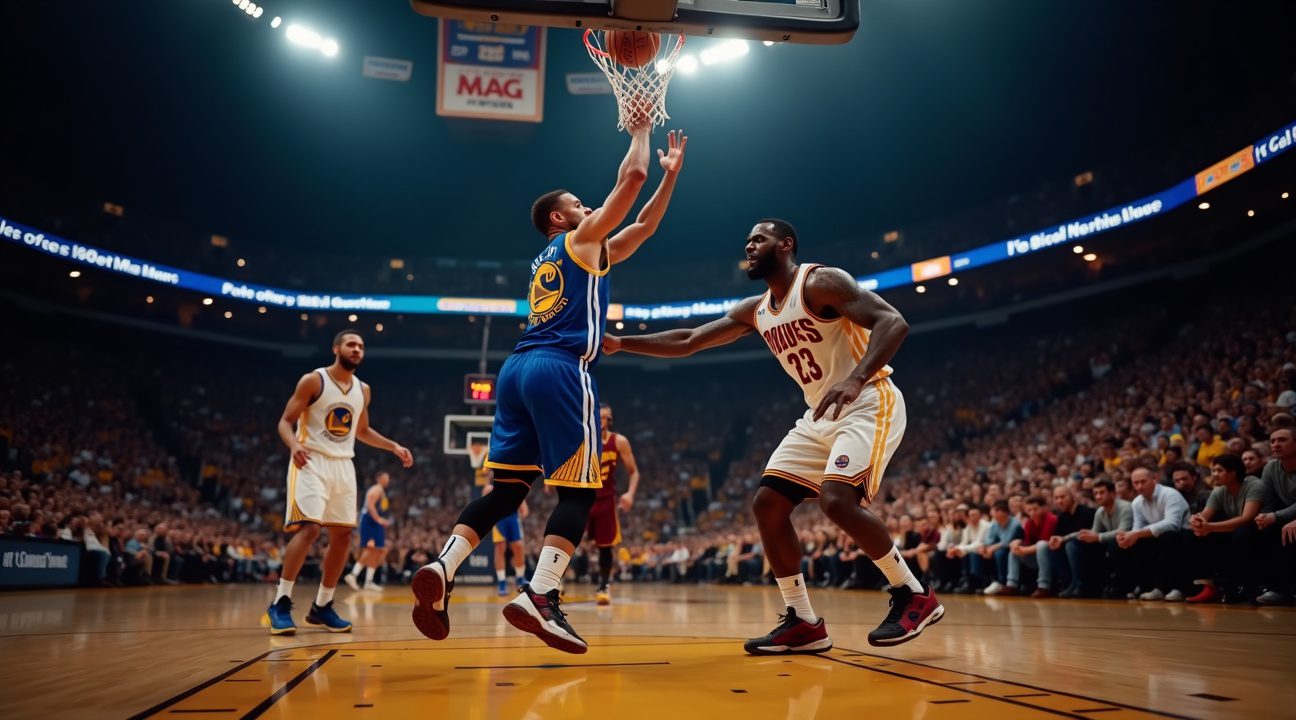
Breaking Traditional Jersey Retirement Standards
Jersey retirements in professional sports follow deeply established conventions that teams have respected for decades. Most franchises reserve this honor for players who spent significant portions of their careers contributing directly to the organization’s success, culture, and identity. Hall of Fame achievements, championship contributions, and years of dedicated service typically form the foundation for these permanent tributes.
Curry’s situation represents a fascinating departure from these established norms. The Golden State Warriors superstar never suited up for Cleveland, never contributed to their regular season victories, and never helped build their franchise culture. His primary connection to the Cavaliers centers on their historic battles during multiple NBA Finals matchups, where he stood as their primary obstacle to championship glory.
Traditional NBA jersey retirement standards emphasize players who demonstrated unwavering loyalty to a single franchise or made transformative contributions during their tenure. Teams typically honor individuals who helped establish winning cultures, brought championships to their cities, or represented the organization’s values both on and off the court. External recognition for opposing players usually manifests through Hall of Fame inductions, respectful acknowledgments during arena visits, or ceremonial tributes by their own teams.
A Symbolic Gesture of Respect
Cleveland’s unprecedented decision reflects something deeper than standard franchise appreciation. This symbolic gesture merges the concept of respectful rivalry with historical reverence, acknowledging how Curry’s excellence elevated their own championship achievement in 2016. The Cavaliers’ historic comeback from a 3-1 deficit gains additional significance because it came against a team led by such an exceptional player.
This move demonstrates how fierce competition can coexist with genuine respect. Rather than harboring resentment over lost opportunities, Cleveland chooses to honor the player who pushed them to their absolute limits. The decision suggests that true greatness transcends team boundaries and deserves recognition even from former opponents.
The implications extend beyond Cleveland’s specific situation. Other franchises might feel inspired to similarly honor players who significantly impacted their narratives, even as adversaries. This could establish a new category of sports honors that celebrates the role opposing players played in shaping franchise history and memorable moments.
Several factors make this gesture particularly meaningful:
- Curry’s influence on basketball extends far beyond individual achievements or team success. His revolutionary approach to three-point shooting fundamentally changed how the game is played at every level.
- Cleveland’s recognition acknowledges this transformative impact while simultaneously celebrating their own ability to overcome such formidable opposition.
The decision also reflects changing attitudes about sports rivalries and historical perspective. Modern fans and organizations increasingly appreciate excellence regardless of team affiliation. Social media and enhanced coverage allow supporters to witness greatness more intimately, fostering respect for opponents who elevate the overall quality of competition.
This precedent could reshape expectations around franchise traditions and sports honors. Teams might begin considering how opposing players contributed to their most memorable moments, championship runs, or defining seasons. The focus shifts from exclusive loyalty to inclusive recognition of basketball excellence and its role in creating compelling narratives.
Critics might argue that jersey retirements should remain exclusive to franchise contributors. However, Cleveland’s approach suggests that modern sports appreciation can accommodate broader definitions of impact and significance. The Cavaliers aren’t diminishing the value of traditional retirements but rather expanding the concept to include players who helped create their most cherished memories.
This move positions Cleveland as forward-thinking in their approach to franchise history and competitor respect. Rather than viewing Curry solely as an obstacle they overcame, they recognize him as an essential component of their greatest triumph. The banner becomes a testament to both his excellence and their resilience, creating a unique form of mutual honor that celebrates the highest levels of professional basketball competition.
Fan and Media Response to Unconventional Honor
The Cavaliers’ unprecedented decision to retire Stephen Curry’s jersey has ignited passionate debates across Cleveland and the broader basketball community. Reactions have split along predictable lines, with traditionalists questioning the wisdom of honoring a player who never wore a Cavaliers uniform, while progressive fans applaud the organization for transcending conventional team boundaries.
Mixed Reception Among Cavaliers Faithful
Cleveland fans find themselves wrestling with conflicting emotions about this historic announcement. Many acknowledge Curry’s undeniable greatness and his transformative impact on basketball, yet they can’t easily forget the painful memories his success created. The 2015 and 2017 Finals losses to Golden State remain fresh wounds for supporters who witnessed their championship dreams dashed by Curry’s otherworldly performances.
Local sports talk radio has become a battleground for opposing viewpoints, with callers either praising the franchise’s bold gesture or condemning what they see as a betrayal of traditional team loyalty. Some fans argue that honoring an opponent demonstrates Cleveland’s class and basketball sophistication, while others believe jersey retirement should remain sacred ground reserved exclusively for franchise legends.
Media Commentary Highlights Historic Nature
Sports commentators have universally described the move as unprecedented and a sign of respect unusual in professional sports. National media outlets have praised the Cavaliers for establishing a new standard in recognizing basketball excellence that transcends team affiliations. This decision echoes other significant NBA traditions, such as when Bill Russell’s number was retired league-wide, demonstrating how the sport occasionally honors greatness beyond individual franchises.
Television analysts have noted that this announcement forces basketball fans to reconsider what jersey retirement truly means in modern professional sports. The debate has spread across social media platforms, where younger fans generally support the progressive approach while older generations express skepticism about departing from established NBA traditions.
The conversation has also highlighted the complex relationship between sports rivalry and mutual respect. Despite Curry’s role as Cleveland’s primary antagonist during multiple championship runs, the Cavaliers organization appears ready to separate competitive history from basketball appreciation. This distinction has created fascinating discussions about whether greatness should be celebrated universally, regardless of team affiliation or past conflicts.
The announcement continues generating headlines across major sports networks, with pundits analyzing both the immediate implications and potential long-term effects on how franchises honor opposing players. The Cavaliers have effectively started a league-wide conversation about the evolution of sports traditions and the appropriate ways to celebrate transcendent talent.
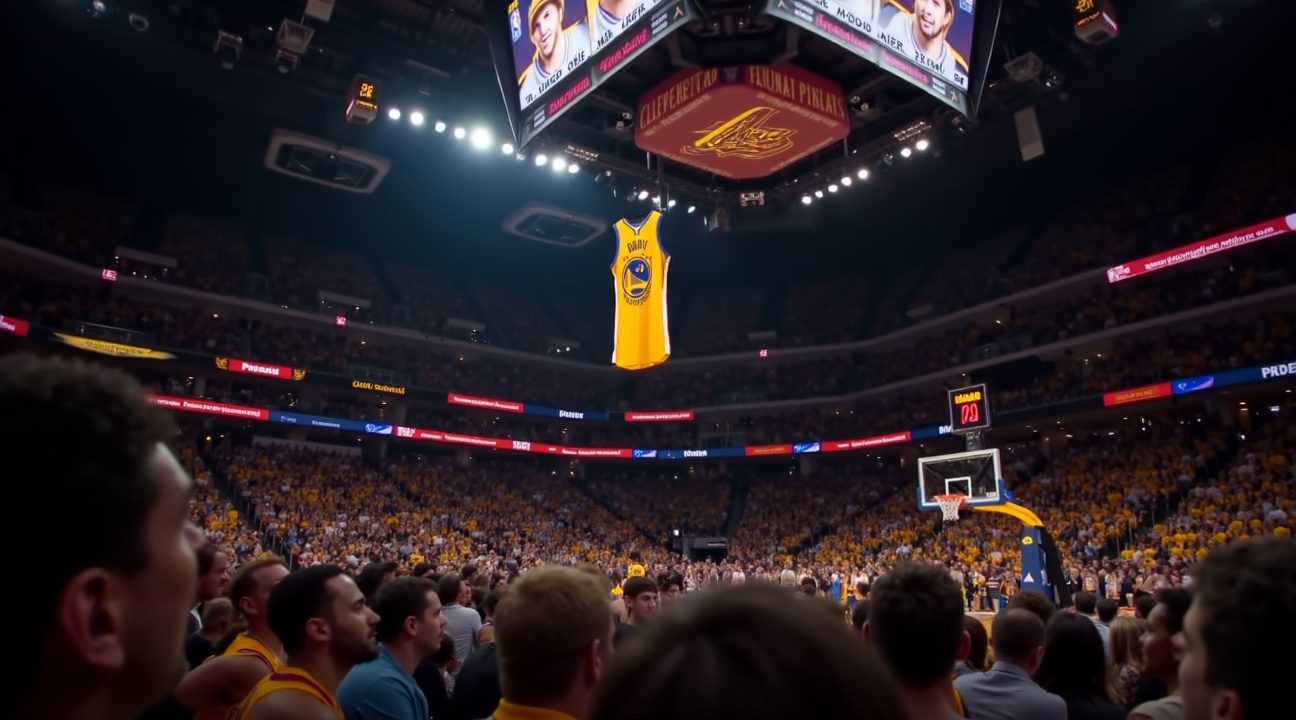
What This Means for Basketball’s Future
A Paradigm Shift in Franchise Honors
The Cavaliers’ unprecedented decision marks a fundamental transformation in how NBA teams approach player recognition. Traditional franchise honors have always focused exclusively on players who contributed directly to a team’s success through their service. This bold move suggests basketball organizations are beginning to value the broader narrative of sports excellence, even when it comes from fierce rivals.
Other franchises will likely take notice of Cleveland’s approach, potentially opening doors for similar gestures across the league. Teams might start considering how certain opponents helped define their greatest moments, championship runs, or most memorable battles. The Los Angeles Lakers could contemplate honoring Larry Bird’s impact on their 1980s rivalry, while the Boston Celtics might reflect on Magic Johnson’s role in creating basketball’s most compelling decade.
This shift represents more than sentiment—it acknowledges that greatness in basketball often emerges through competition rather than isolation. Curry’s influence on Cleveland’s championship story demonstrates how opposing players can become integral parts of a franchise’s identity and legacy.
Evolution of Sports Recognition and Respect
Basketball traditions are expanding beyond conventional boundaries, and this gesture establishes a new framework for celebrating competitive excellence. The league has already seen precedent with Bill Russell’s number retirement across all teams, though that honored his broader contributions to basketball and society.
Future NBA teams might develop new categories of recognition that separate direct franchise contributions from competitive impact. Consider these potential developments:
- Cross-franchise tributes honoring players who elevated rivalry intensity
- Special recognition for opponents who pushed teams to championship levels
- Memorial sections dedicated to players who defined specific eras through competition
- Annual ceremonies celebrating the greatest battles between franchises
The Cavaliers’ choice reflects basketball’s maturation as both sport and entertainment. Fans appreciate compelling narratives, and acknowledging how opponents contribute to those stories creates richer historical context. Curry’s jersey retirement in Cleveland wouldn’t diminish his Golden State legacy—it would enhance the overall story of both franchises.
Competitive legacy extends beyond individual achievements to encompass how players shape entire organizations. Curry’s presence forced Cleveland to evolve their playing style, defensive schemes, and roster construction. His influence helped create the environment where LeBron James delivered one of basketball’s greatest championship performances in 2016.
This approach to sports respect could fundamentally alter how teams view their histories. Instead of isolated success stories, franchises might embrace interconnected narratives that include both triumph and worthy opposition. Basketball’s future may feature more nuanced recognition systems that celebrate the complete ecosystem of competition rather than just individual franchise achievements.
The Cleveland decision sets a precedent that could reshape basketball traditions for generations. Teams might begin viewing their greatest opponents not as obstacles to success, but as essential elements that helped define their most meaningful victories. This evolution in thinking represents basketball’s growing sophistication in understanding how competition creates legacy.
Sources:
Wikipedia – Stephen Curry; StatMuse – Stephen Curry stats; Bleacher Report – Davidson Reiterates Stephen Curry’s Jersey Won’t Be Retired Until He Graduates; Pro Football Network – Stephen Curry Stats, Records, Warriors; Fear The Sword – What Cavaliers Should Have Their Jersey Retired; Wikipedia – List of Career Achievements by Stephen Curry

